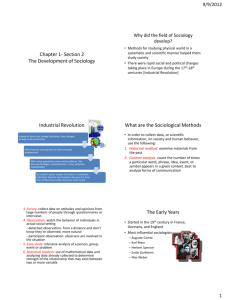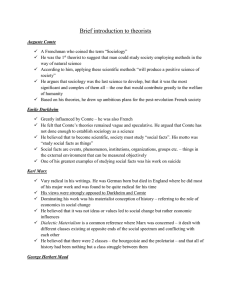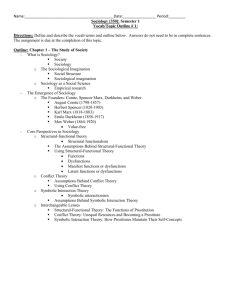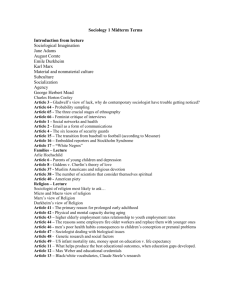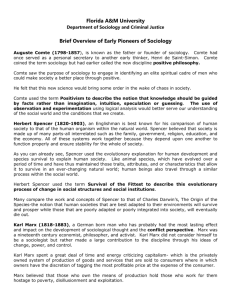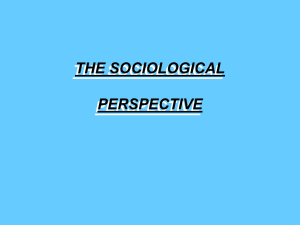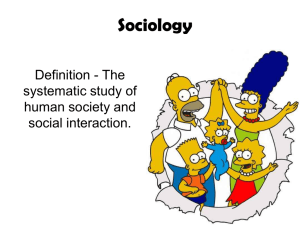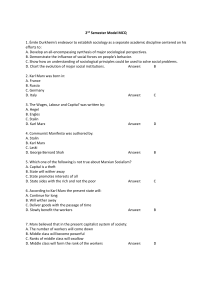Early Sociologists and Perspectives*
advertisement
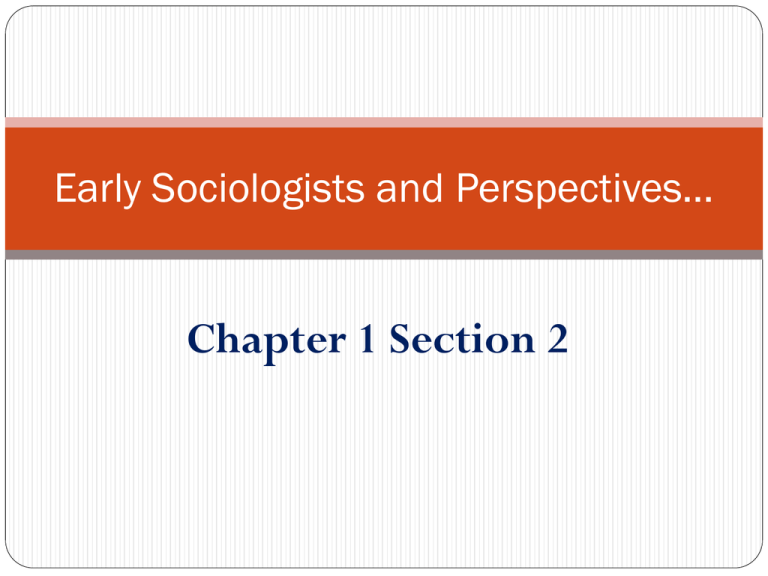
Early Sociologists and Perspectives… Chapter 1 Section 2 Roots of Sociology… 1800’s Started in Europe – primarily France, Germany & England all of which were significantly changed due to industrialization; Observation, controlled experiments, collection & analysis of data all led to the theories of the following men…who are considered the early pioneers in the field of Sociology. AUGUSTE COMTE (1798-1857) French scholar who first applied the methods of physical science to studying social life; also the first to come up with the term sociology to refer to the study of society. Comte believed that studying the “social static” (things that held society together) along with the “social dynamics” (things that cause social change) would be helpful in order to reform societies. Although not well received in his time…his ideas on social order & change are still used today. HERBERT SPENCER (1820-1903) English laborer who inherited a lot of $$ in his 30’s and used it to pursue the study of society. Strongly influenced by Charles Darwin’s theories of evolution, Spencer adopted a biological model of society and determined that society is a set of independent parts that work together to maintain the system over time (similar to how a biological system works together to maintain a living organism). SPENCER continued… From this theory Spencer concluded that Social change & unrest are a natural part of society’s evolution; The best aspects of a society will survive over time so no need to correct social problems; Only the fittest societies would survive overtime and this would lead to a general upgrading of the world as a whole – referred to as social Darwinism. KARL MARX (1818-1883) German whose ideas focused on the theory that the structure of a society is governed by how its economy is organized. Focused on the conflict between 2 social classes – proletariat (workers) & bourgeoisie (owners); since clashes between classes would always cause conflict Marx proposed a “classless society” as the ideal. Reward based on NEED not ABILITY. Also not well recognized during his time – but he has influenced many generations since. EMILE DURKHEIM (1858-1917) French professor who was among the first to apply methods of scientific study to sociology. Concern with social order (like Comte) led to the idea that the interdependent parts of a society all served a specific function that was necessary for the maintenance of the whole social system. EX: religion helps maintain social order because common beliefs hold followers together. Observable phenomena – study things that are directly observable; collect data & use it to learn more about the social problem & solve it (suicide studies). MAX WEBER (1864-1920) Prussian professor who focused on separate groups within a society. His works focus on the effect of the society on individuals. Unlike Durkheim, Weber believed that studying Unobservable things (feelings, emotions, etc.) would also produce valuable insight into understanding societies. He called this Verstehen – why do people act as they do? This led him to develop an ideal type – which is a description of the essential characteristics of a feature of society. (EX: create an ideal type for public schools… - what essential characteristics would need to be present?) SOCIOLOGICAL THEORIES… A theory is an explanation of the relationships among particular things…so a sociological theory would attempt to explain the relationship between the particular parts of a society. There are 3 broad theoretical perspectives you need to know to get through the rest of this course. The ideas of the men you just learned about each fall under one of these theories… FUNCTIONALISTS; INTERACTIONISTS; CONFLICT (tonight’s HW) Name that sociologist! QUOTE: “You are horrified at our intending to do away with private property. But in your existing society, private property is already done away with for nine-tenths of the population; its existence for the few is solely due to its non-existence in the hands of those nine-tenths.You reproach us, therefore, with intending to do away with a form of property, the necessary condition for whose existence is the nonexistence of any property for the immense majority of society.” Marx Name that sociologist… QUOTE: “There is no absolutely ‘objective’ scientific analysis of culture . . . [because] . . . all knowledge of cultural reality . . . is always knowledge from particular points of view” Weber QUOTE: “Each victim of suicide gives his act a personal stamp which expresses his temperament, the special conditions in which he is involved, and which, consequently, cannot be explained by the social and general causes of the phenomenon.” Durkheim NAME THAT SOCIOLOGIST… QUOTE: “Now, the existing disorder is abundantly accounted for by the existence, all at once, of three incompatible philosophies, -the theological, the metaphysical, and the positive. Any one of these might alone secure some sort of social order; but while the three coexist, it is impossible for us to understand one another upon any essential point whatever.” Comte "This survival of the fittest, which I have here sought to express in mechanical terms, is that which Mr. Darwin has called 'natural selection', or the preservation of favored races in the struggle for life.“ Spencer

